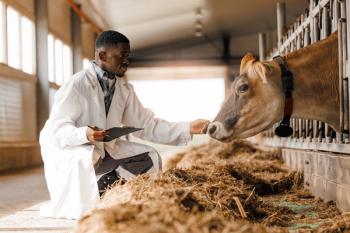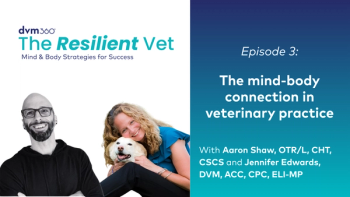
Know laws, responsibility regarding legal pharmacy compounding
Dr. Joseph J. Bertone explores they myriad of legal and ethical problems veterinarians face when using some compounded drugs.
Veterinarians are often unclear on the differentiation and clinical ramifications of the use of pioneer and generic drugs and registered products, medical devices and pharmacy compounded products. In addition, what are the laws that revolve around these issues?
Definitions
Drug piracy
Ethical pharmacies provide drug formulation for special needs and when no other similar route active ingredient is available.
Drug piracy is the mimicry of Food and Drug Administration (FDA) approved drugs. The pirated formulations are sold under the guise that one can expect the same quality, clinical safety and efficacy as compared to FDA-approved products. It is impossible for a drug pirate (often disguising themselves as a compounding pharmacist) to formulate a product with the same quality, purity and stability of an FDA-approved product and assure efficacy and safety. Licensed pharmacists know they can't produce products of the same quality as FDA-approved formulations. Examples of drug piracy include attempts to mimic AdequanTM, GastrogardTM, KetofenTM, BanamineTM, Hylartin-V-TM, RimadylTM, EnalaprilTM, MetacamTM, etc. This practice is initiated by the ignorance or avarice or both on the part of the pirate, and supported by either the ignorance or avarice or both of veterinarians.
Added to the spectrum of activities of some drug pirates is the promotion of untested drugs and untested routes of administration, as if they have data to support this information (e.g., topical drug administration of antibiotics for systemic disease).
Drug compounding
There are two kinds of drug compounding.
1. Drug compounding may involve the alteration of FDA-approved products. An example would be mixing AcepromazineTM and RompunTM in the same syringe at the patient's side. There is a provision in the law for this practice under the Federal Food, Drug and Cosmetic Act, Animal Medicinal Drug Use Clarification Act (AMDUCA). Alteration of FDA-approved products will not be covered in this article.
2. The more important form of compounding relative to this article is the compounding of bulk chemicals to form a new product. The focus of this article is drug compounding from bulk products to create a new formulation.
Bulk products
Bulk products are basically chemicals in drums, boxes, bags and bottles. In the case of most bulk drug products used by drug pirates in veterinary medicine, the products are often smuggled into the United States and come from India, Pakistan and China. The quality of these products is always questionable. There is no guarantee of the products' strength, content and purity (e.g., How much active hyaluronic acid of a known molecular weight is in the powder? Is there hyaluronic acid in the powder? What else is in the powder?).
Photos 1 and 2: Pirated "enrofloxacin" created from smuggled-into-the-country "enrofloxacin", specifically made to treat food animals.
Legitimate pharmacy compounding
Pharmacy compounding is the legitimate activity of drug formulation to produce a product for medical management. Formulation is performed by a licensed pharmacist when no other FDA-approved choice is available (e.g. dipyrone injectable or KBr). Prescription and labeling guidelines must be followed. Many compounding pharmacies produce excellent products, follow the law and Good Compounding Practices guidelines and care about patients. Unfortunately, many drug pirates are licensed pharmacists, but producing a pirated drug is not legitimate compounding pharmacy.
Pioneer, generic, registered drugs
Pioneer, generic and registered drugs all have FDA approval. All are manufactured under Good Manufacturing Practices (GMP) legislation and guidelines. Pioneer drugs are the original product under which drug sponsors collected efficacy and safety data for FDA approval. Generic drugs are drugs that are allowed to be marketed based on essentially matching pharmacokinetics to the pioneer and the determination that the constituents of the product provide no safety risk. As with pioneer products, generic products require FDA approval. Registered products are intravenous fluids, vitamins with no claim, but are allowed to be marketed by FDA and still undergo GMP manufacturing criteria.
A common misconception by veterinarians, and often indicated by drug pirates, is that pirated drugs are generics. That is completely wrong!
Pirated drugs have no claim to drug quality, purity and stability. The bulk product is often made in laboratories in China, India and Pakistan. No bulk drug intended for use in veterinary species is allowed to be imported into the United States. Therefore, all of the bulk chemicals used in drug piracy have been imported illegally. Is this a Homeland Security issue?
Medical devices
There are no veterinary device regulations. In other words, devices such as radiology equipment, extracorporeal shock wave equipment or ultrasound equipment specifically marketed for veterinary use have no governmental oversight, unless there is some relationship to food or public safety. Why is this important to understand? Products like MAP5TM (sodium hyaluronate, Bioniche Animal Health) registered as a device for its use as a cryopreservative, ChondroprotecTM (glycosaminoglycan, Neogen Corp.) and HycoatTM, both registered as devices for wound dressing, are not regulated by the FDA for use in animals. There is no provision in the law to use a device (these products) as a drug. Hence, when you use them, you are outside the law. The marketing of these products in veterinary medicine is likely a means to avert the law and adversely affects future drug development. The products have not been efficacy- and safety- tested for use in horses or any other species. If you get in trouble with these products, in their use in veterinary species, the sponsor has no responsibility to you. They are also not produced under drug GMPs. They do not meet the standards.
Background: laws
Why do we have laws that ensure the quality of drug products? In 1936, Massengill Company attempted to create a sulfanilamide suspension for use in children. Unfortunately, and without knowledge, the pharmacists used a solvent that was tainted with 72 percent diethylene glycol. There were 105 human deaths associated with this incident. The Food and Drug Act (later adding cosmetics) was codified in 1938 to assure drug efficacy, safety, quality, strength and purity. It was well recognized that these attributes could not be guaranteed under normal drug compounding with bulk products. This is why I often discuss drug piracy as the "devolution of veterinary medicine to the turn of the last century." So that you do not think that this is an issue of the past, a similar "Massengill-like" incident occurred in Haiti in 1995 and 1996 and led to 87 deaths. The DEG contamination was due to a tainted excipient from China.
The law provides no provision for compounding drugs for animals from bulk drugs. That means that drug piracy is against the law. In addition, it may sound contrary, but there is no provision for a legitimate compounding pharmacy using bulk drugs. AMDUCA (21 CFR § 530.13(b) allows for alteration and the combination of FDA-approved formulations. The Center for Veterinary Medicine Compliance Policy Guideline (Compounding of Drugs for Use in Animals, 608.400 (www.fda.gov/ora/compliance_ref/cpg/cpgvet/cpg608-400.html) indicates that the government is interested in stopping practices "outside the bounds of traditional pharmacy practice (e.g., compounding that is clearly intended to circumvent the drug approval process…)."
This means that it is illegal to compound from bulk chemicals for non-food animals. However, FDA is unlikely to pursue this practice if there is an essential medical need and there is no other FDA-approved drug available for treatment of the patient. Bulk chemical (drug) use for food animals is not tolerated, under any circumstance (Photos 1 and 2).
That means the formulation and use of drugs compounded from bulk products is the use of an adulterated, misbranded and mislabeled product. How would you like to be on the wrong side of that statement in a case involving an infected joint that you injected with a compounded preparation!
Liability issues
Article 7 under exclusions in your Professional Liability Insurance policy states:
"This certificate does not apply: …7. to liability arising out of the intentional performance of a fraudulent or criminal act…
Using a pirated product is the use of a misbranded, mislabeled and adulterated product by law. I have had a few people indicate to me that they can use the "standard of practice" to overcome this issue. Standard of practice only relates to issues not stated as outside the law. If a whole group of people is speeding, that does not mean that speeding is legal.
Nature of drug piracy?
I continue to ask this question and as yet have identified only two possibilities.
1. The knowledgeable pirate. This pirate knows that FDA-approved products are better for the patient and the legal, ethical and scientific basis for this finding. The only conclusion then is that this pirate has no care for veterinary patients, clients, our profession or your practice.
2. The ignorant pirate. This pirate actually believes that the things he/she mixes are just as good as approved products produced under GMP and regulated by the FDA. This pirate believes that the bulk sources they use in unfriendly countries are equivalent to sources used in legal pharmaceutics within the United States. The only conclusion that can be reached is that this pirate has no skills in compounding pharmacy and has no understanding of pharmaceutic science.
In conclusion, drug pirates are either unknowledgeable or care nothing about veterinary medicine. Your clients are paying for the pirate's lack of knowledge or for their unethical behavior.
Choosing a compounding pharmacy
Let me make this clear: legitimate compounding pharmacy is not drug piracy. In fact, the American College of Veterinary Pharmacists indicated they are appalled by this activity, and they are being inadvertently and adversely affected by this practice. Legitimate pharmacy drug compounding is based on the extent of knowledge and ethical behavior of the pharmacist. It is nearly impossible to identify the extent of a pharmacist's knowledge in compounding and if the pharmacist you are considering is an ethical individual. However, since drug piracy is an indication of lack of ethical behavior, or lack of knowledge, then, at a minimum, good compounding pharmacists do not drug pirate.
What you don't know about pirated products
Nice profit margin! Consider this: You purchase Drug A from a licensed distributor. Drug A is an FDA-approved drug or a true generic for xylazine. You find out that you can purchase something from a "compounding pharmacy" that claims it has the same active ingredient of drug A, but it is 20 percent of your cost (compounding pharmacy is quoted because this is not the practice of pharmacy, although the pirates call themselves compounding pharmacists). You can pass the savings on to your client. However, many of you charge your client the same amount as you would have for the FDA-approved drug. This is a mark-up of 500 percent, or more in many cases. How can this be a problem?
Well, let's hope you didn't know that:
1. Since an approved product is available, you sold your client a product that is substandard by definition.
2. Since the pirated product is not produced under GMP regulations and guidelines, you have no assurance that the product in the bottle is what the pirate says it is. In fact, analyses to date indicate that the range of content of the active ingredient is 0 to 176 percent of the bottle label. Unfortunately, we have no data on non-pirated drugs produced by good compounding pharmacies. However, since these individuals are more likely to understand their art and practice ethically, we can assume that these products are of much higher quality.
3. You have no assurance of a pirated drug's efficacy and safety attributes, especially when compared to an FDA-approved drug. You don't know what drug you have given. That speaks for itself.
4. By legal (Food, Drug and Cosmetic Act) definition, the pirated product is misbranded, adulterated and mislabeled. Keep that in mind when thinking of legal liability. Also keep in mind that since the use of these drugs is illegal, that you risk liability coverage when you use them in veterinary patients. See PLIT item 7 under "exclusions for coverage" in your policy.
5. Pirated drugs are not generic drugs. Generic drugs are FDA-approved and undergo the same stringent FDA requirements for manufacturing as original FDA-approved drugs. Many drug pirates (who misrepresent themselves as compounding pharmacists) portray the stuff they make as generic products. They are not.
6. Since you added a mark-up to the product (which identifies the provider "compounding pharmacy" as a renegade drug manufacturer) you may be responsible for a "pharmacy" closure. Pharmacies are not licensed drug distributors nor drug manufacturers.Therefore, they are not a source for better drug margins.
Why would one hope you did not know the six points listed? There are only two choices: drug pirates are either ignorant of their craft, or they understand what they are doing and are preying on you and your clients. They are violating the public trust. However, with respect to you, the veterinarian, if you did not have this information, and you sold your client the pirated product, you were just ignorant of the facts. Blame it on your education.
Suggested Reading
This article provides you with information that, hopefully, will improve the quality of your practice. The goal of the article is to offer information so that you can make informed drug-use decisions that will not violate the public trust.
Dr. Bertone is professor of equine medicine at Western University of Health Sciences College of Veterinary Medicine. He received his DVM and BS degrees (nutrition concentration) from Cornell University (1983). He completed a residency-training program, and a MS degree at Colorado State University. He served on the faculties of Louisiana State University and The Ohio State University, in addition to the Food and Drug Administration Center for Veterinary Medicine. He was recently nominated for the AVMA Council on Biologics and Therapeutic Agents, representing equine practice.
Newsletter
From exam room tips to practice management insights, get trusted veterinary news delivered straight to your inbox—subscribe to dvm360.






